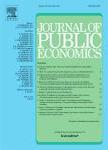-
作者:BILODEAU, M
摘要:The performance of tax-earmarking institutions that require individuals to contribute some minimum levels toward public goods but do not constrain the composition of their contributions is examined. It is shown that in a non-negligible class of circumstances, leaving the spending decisions in the hands of individuals would yield a unique non-cooperative equilibrium in the (constrained) core. These results are then applied to the analysis of financing rules for public and separate schools in Ca...
-
作者:BOADWAY, R; MARCHAND, M; PESTIEAU, P
作者单位:Universite Catholique Louvain; University of Liege
摘要:Despite the fact that all developed economies levy broadly based indirect taxes alongside direct taxes, little theory is devoted to explaining the direct-indirect tax mix. Our purpose is to show that if different taxes have different evasion characteristics, some optimal tax mix emerges naturally. Assuming that only income tax can be evaded and focusing on a two-class economy, we analyse the case for supplementing optimal (non-linear) income taxation with commodity taxation, and we develop con...
-
作者:COATE, S; JOHNSON, S; ZECKHAUSER, R
作者单位:Harvard University; University of Pennsylvania
摘要:The pecuniary effects of cash and in-kind programs differ. A program that builds housing for the poor, for example, is likely to result in a lower price of existing low-income housing than would an equally costly cash transfer program. Low-income renters in general would benefit; landlords would lose. This paper argues that these pecuniary effects provide a previously unstudied rationale for the use of in-kind programs. Specifically, in a world in which the government has limited ability to ta...
-
作者:HELSLEY, RW; OSULLIVAN, A
作者单位:Oregon State University
摘要:An altrusitic citizen votes 'yes' in a referendum if the perceived benefit of the project exceeds its perceived cost. The altruist gets information about benefits and costs from contributions to the 'pro' and 'con' campaigns. In the Nash equilibrium of a campaign-contribution game with two beneficiaries, altruists vote on the side with the largest contribution, and altruistic voting guarantees efficient choices. If there are many agents, however, altruistic voters do not always make efficient ...
